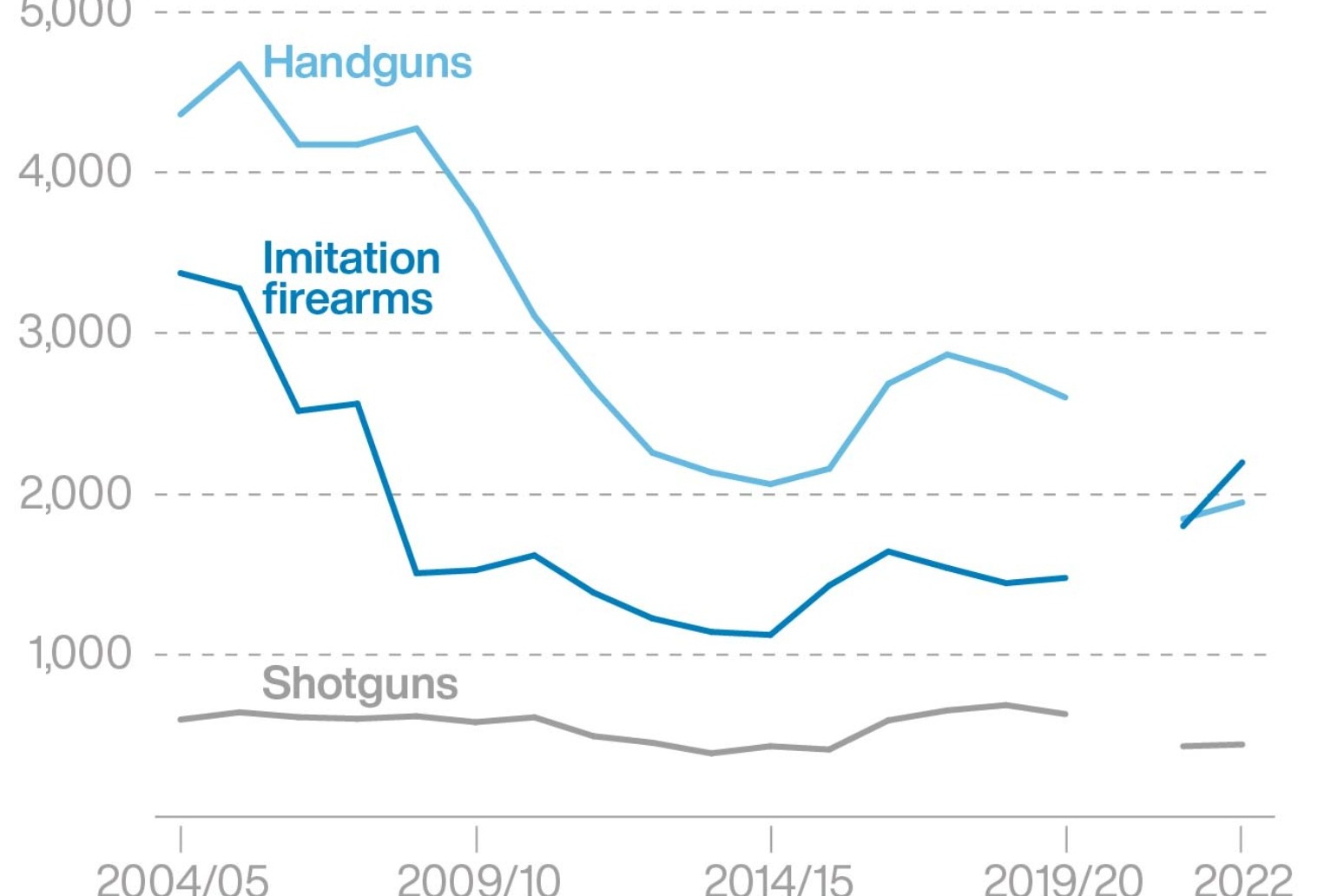
Imitation firearms now main weapon used in gun crime – figures
Imitation firearms are now the main type of weapon used in gun crime in England and Wales, figures show.
The Office for National Statistics (ONS) said a rise in gun crime was largely down to the growing presence of imitation firearms.
Some 6,193 firearms offences were recorded by police in 2022, an 11% increase on the 5,581 logged a year earlier.
The use of imitation firearms – anything which looks like a gun regardless of whether it can shoot a bullet – recorded by police in such offences rose 22% in a year, from 1,800 in 2021 to 2,196 in 2022 and is “now the most prevalent principal weapon” in those types of offences, the ONS said.
Imitation firearms accounted for more than a third (35%) of firearms offences in 2022, ahead of handguns (31%) and unidentified firearms (16%) – the first time imitation firearms have been the most prevalent type.
In 2021, handguns were slightly more prevalent than imitation firearms, accounting for 33% and 32% of police-recorded firearms offences respectively, while in the pre-pandemic 12 months to March 2020 the gap was wider, at 40% for handguns and 23% for imitation firearms.
The figures also show there was a rise in threats to kill being made using knives last year being reported to police.
Overall, the number of knife crime offences recorded by police in 2022 (49,265) was 9% lower than levels prior to the coronavirus pandemic in the year to March 2020 (54,230).
Despite this, the number of threats to kill made with a knife that forces recorded rose by 22% to 5,942 offences in 2022.
In the 12 months to March 2020, 4,861 offences were recorded.
The ONS said the figures for police-recorded crime exclude data from Devon and Cornwall Police because of problems with a new computer system.
There were 189,731 sexual offences recorded by police in England and Wales in 2022, up 7% from 177,646 in 2021 and up 19% from 159,080 in the pre-pandemic year of 2019/20.
The rise reflects improvements in police recording practices and increased reporting by victims, which means the figures “do not provide a reliable measure of trends in these types of crime”, the ONS said.
The data may also have been influenced by “the impact of high-profile cases and campaigns on victims’ willingness to report both recent and historical incidents”.
Similar factors are likely to have contributed to the rise in police-recorded rape offences, which stood at 67,169 in 2022, up 3% from 64,900 in 2021 and up 17% from 57,586 in the year to March 2020.
The overall number of crimes recorded by police in England and Wales in 2022 stood at 6.6 million, compared with 5.9 million in 2021 and 6.0 million in 2019/20, though this is “unlikely to reflect a genuine increase in crime”, the ONS said.
This is because the rise has been driven chiefly by increases in the offence categories, which are “most subject to changes in reporting and recording practices”.
Separate figures published on Thursday from the ONS Crime Survey for England and Wales for the year ending December 2022 suggest adults experienced 9.0 million offences, down 12% from 10.2 million in a survey for the year ending March 2020.
The survey measures experiences of crime in the 12 months before interview, meaning the 2022 survey, which was conducted between January and December last year, reflects crimes that could have occurred as far back as January 2021.
Experiences of crimes, as measured by the ONS survey, have been on a broad downwards trend since the mid-1990s.
Pete Jones of the ONS said: “Overall crime decreased in 2022 compared to before the pandemic, mainly driven by a reduction in theft. However, it is too early to say whether this will continue to be an ongoing trend.
“Though relatively low numbers, there was a large increase in the number of advance fee fraud cases, where victims make advance or upfront payments for goods or services that do not materialise. This may be in relation to increased levels of online activity during the pandemic.
“For crimes which are well-reported and recorded by the police we can gain additional insight from police data.
“Today’s figures show robbery, knife crime and firearm offences are all down on what was seen pre-pandemic but have risen in the last year.
“There have also been increases in other police recorded crimes, such as sexual offences and rape, but we need to be cautious when interpreting these figures.
“They can reflect a number of factors including the impact of high-profile cases and victims’ willingness to report both recent and historical incidents.”
Estimates from the crime survey for the year to December 2022 suggest there were 454,000 advance fee fraud offences in England and Wales, more than seven times the number recorded in the survey for the year to March 2020 (60,000).
William Christopher, civil fraud partner at the law firm Kingsley Napley, said: “The significant rise in advanced fee fraud is one we can probably all relate to.
“Scammers demand an up-front payment for goods or services that never materialise – via fake ads for loans, concert tickets or rental properties for example, or even targeting victims by text pretending to be a delivery company.
“The reason this type of fraud is rising at such an alarming rate is that fraudsters believe they can get away with it – the criminal justice system just isn’t keeping up.
“Whilst the economics of civil legal action can often be a deterrent from pursuing fraudsters, especially given they are often overseas, victims who have lost large sums should always explore the chances of redress. Fraudsters are not above the law.
“However, it is, of course, better to remain vigilant and suspicious of scams wherever possible. Education and awareness of the risks is in many ways the best method of fraud prevention.”
Published: by Radio NewsHub